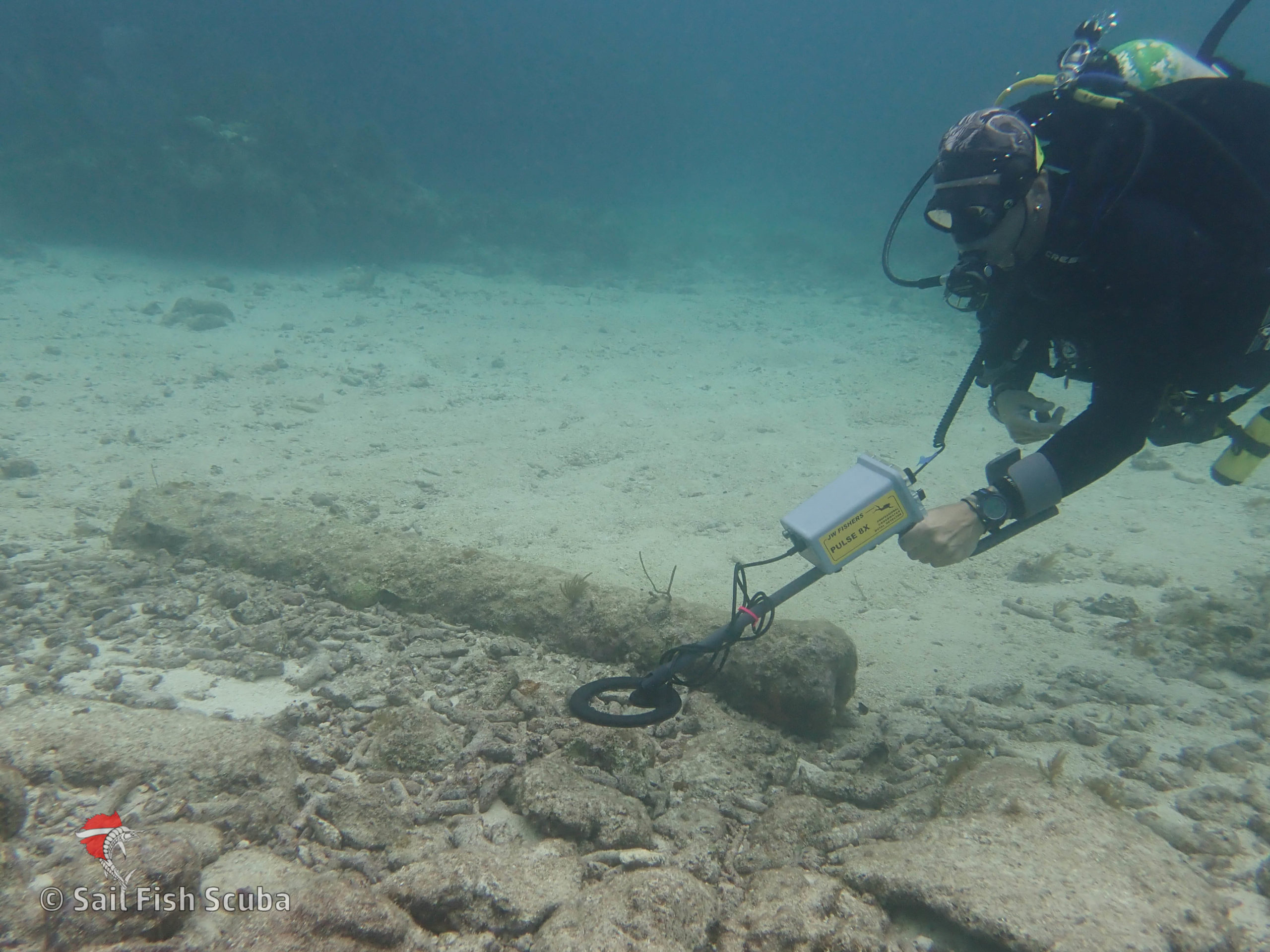Do metal detectors work underwater?
Summary:
Are you curious about metal detecting underwater? This article will answer some common questions about metal detectors and their capabilities. Metal detectors can detect objects about 4-8ʺ (10 – 20 cm) deep, but in ideal conditions, they can reach depths of 12-18ʺ (30-45 cm). Specialized detectors can even go as deep as 65′ (20 m).
Q: How deep can a metal detector go underwater?
A: Most metal detectors can reach a depth of about 4-8ʺ (10 – 20 cm) underwater. In ideal conditions, they can go as deep as 12-18ʺ (30-45 cm), and some specialized detectors can reach depths of 65′ (20 m).
Q: How do you find metal underwater?
A: When metal detecting underwater, you can walk along the beach until you find a signal. Use the metal detector to pinpoint the exact location of the metal object.
Q: Will a metal detector find gold underwater?
A: Yes, shallow water metal detecting is an exciting way to hunt for valuable targets such as gold rings, coins, and other jewelry.
Q: What can a metal detector not detect through?
A: Metal detectors cannot detect stainless steel, gemstones, pearls, bones, diamonds, paper, and stone figures.
Q: What is the deepest a metal detector can detect?
A: Most metal detectors can detect coins at a maximum depth of 10 to 16 inches. However, some detectors can locate larger treasures at depths of over 20 feet.
Q: How deep does a Bounty Hunter metal detector go?
A: A Bounty Hunter metal detector can find coin-sized metal targets on the surface and up to 10 inches deep.
Q: What is the best metal detector for ocean water?
A: Pulse Induction (PI) detectors are the best for ocean water as they can see through minerals and are not affected by salt water or black iron sand and rocks.
Q: Is it worth metal detecting on the beach?
A: Metal detecting on the beach can be rewarding as you can find buried treasures easily in the sand while enjoying the cool water.
Q: What is the best metal detector for finding gold in water?
A: The Minelab SDC 2300 is a great metal detector for finding gold nuggets, both on dry land and in water.
Q: Can gold be traced in water?
A: Trace quantities of gold can be found in freshwater, seawater, incinerated sludge, and the effluent water of treatment plants.
Q: What will trigger metal detectors?
A: Multi-Zone Metal Detectors may be triggered by objects in the environment that emit or reflect electromagnetic fields, such as fluorescent lights, computer monitors, and structural steel.

How deep can a metal detector go underwater
Are you curious about metal detecting, and wondering how deep a metal detector can go Most metal detectors can detect objects about 4-8ʺ (10 – 20 cm) deep. In ideal conditions, a mid-range metal detector can reach 12-18ʺ (30-45 cm) underground. Some specialized detectors can go as deep as 65' (20 m).
How do you find metal under water
That are shallow. So you will just walk on the beach. Until you find a signal. Now i have one signal. Here i will use my metal detector to pinpoint.
Will a metal detector find gold under water
Shallow water metal detecting may be one of the most exciting ways to hunt. You are more likely to find valuable targets – like gold rings, coins, and other jewelry – than in most other locations.
Cached
What can a metal detector not detect through
Stainless steel, by definition, has a low magnetic permeability, which means that it does not produce a signal strong enough to be recognized. Other items that a metal detector will not detect are gemstones, pearls, bones, diamonds, paper and stone figures.
What is the deepest a metal detector can detect
Most metal detectors can detect coins at an average maximum depth of 10 to 16 inches. Metal detectors transmit radio frequency signals from the search coil to locate the targets from the ground's surface to a depth of over 20 feet for large deep treasures.
How deep does a bounty hunter metal detector go
Finds coin-sized metal targets on the surface and buried up to 10 inches deep. ALL PURPOSE METAL DETECTOR: Can detect all types of metal. Perfect for jewelry, coins, and artifacts, and you can even find gold nuggets on land and shallow water.
What is the best metal detector for ocean water
Pulse Induction (PI) detectors
PI metal detectors have the natural ability to see through minerals of all kinds to find metal targets. Whether it's salt water or black iron sand and rocks, PI's are the least affected by minerals in the ground making them some of the best metal detectors to use at the beach.
Is it worth metal detecting on the beach
Metal detecting at the beach is a great way to see what's buried and waiting to be unearthed. As you start your treasure hunt at the beach, you will quickly discover that the sand is easy to dig. And lets face it, what is more enjoyable than being able to cool off in the water!
What is the best metal detector for finding gold in water
Minelab SDC 2300. The perfect unit is you don't fancy spending the time to learn all the processes involved with owing something like a GPZ 5000 or 7000. This metal detector was set with the task of having just one job to do – finding elusive sub-gram gold nuggets both on dry land and water.
Can gold be traced in water
In addition to ore and e-waste, trace quantities of gold are found in freshwater, seawater, incinerated sludge, and the effluent water of treatment plants.
What will trigger metal detectors
Multi-Zone Metal Detector
False alarms may be caused by objects in the environment that can emit or reflect electromagnetic fields. Fluorescent lights, computer monitors, and structural steel are some examples of objects that can cause interference.
What interferes with a metal detector
Machines and devices that emit radio waves, electromagnetic fields, or high vibration may cause interference and false signals. High current load equipment running on the same power source as your metal detector may also cause false rejections by creating spikes in voltage.
What is the biggest piece of gold found with a metal detector
Hand of Faith
It was there that the “Hand of Faith” — the biggest known golden nugget — was discovered in 1980, weighing 876 ozs. That nugget currently resides in Las Vegas' Golden Nugget Casino. Equipped with a more expensive detector, the man who found $160,000 nugget said he's going back to see if he can strike gold again.
Which is the most difficult metal detected by metal detector sensor
stainless steel
It can be said that the most difficult metal to detect is stainless steel. The reason for the inability of the device to locate stainless steel is due to its poor electrical conductivity.
What’s the deepest a metal detector can detect
Most metal detectors can detect coins at an average maximum depth of 10 to 16 inches. Metal detectors transmit radio frequency signals from the search coil to locate the targets from the ground's surface to a depth of over 20 feet for large deep treasures.
Can bounty hunters kick in doors
Yes. Standard bail bond agreements usually come with a section you sign allowing the bounty hunters to find and detain you. Bounty hunters in some circumstances have more authority than the police, including breaking and entering a home if they know you are there.
Does salt water affect a metal detector
Pulse Induction (PI) detectors
PI metal detectors have the natural ability to see through minerals of all kinds to find metal targets. Whether it's salt water or black iron sand and rocks, PI's are the least affected by minerals in the ground making them some of the best metal detectors to use at the beach.
Can I use a metal detector on a beach
Beaches are a great place to use a metal detector. The dry sand is loose, making it easy to dig, and there are usually plenty of people around if you need help. Check local metal detecting laws before you start, as some beaches have restrictions. For optimal beach detecting, choose a spot that looks promising.
Why do people walk the beach with a metal detector
Beaches are one of the best places to search for buried treasure. Not only are there often hidden treasure finds to be found in the wet sand, but the saltwater is also great for helping to break down metals and make them easier to detect.
Will a cheap metal detector find gold
Yes. Most metal detectors are capable of finding gold but some will do a much better job than others. Since gold has rather low conductivity, metal detectors that use higher frequencies will spot gold better than low-frequency detectors.
What color does fake gold turn in water
If the liquid turns greenish, the item is probably mostly another metal like zinc and plated with gold. If the liquid turns a milky color, the item most likely is mostly sterling silver and plated with gold.
How do you know if you found gold in a river
Water is slowed down by sand bars so gold tends to drop out and build up there. You want to look for signs of gold like black sands, pyrite and small quartz, as these are all usually good indicators of gold being in the area.
Why don’t jeans set off metal detectors
Jeans. Jeans are fine to wear through airport security. So, don't worry, you won't be asked to remove them! Some people might be concerned that metal buttons and zips on jeans will set off the metal detectors at airport security but these metals are so small that they're unlikely to get picked up.
How deep can metal detectors detect
Most metal detectors can detect coins at an average maximum depth of 10 to 16 inches. Metal detectors transmit radio frequency signals from the search coil to locate the targets from the ground's surface to a depth of over 20 feet for large deep treasures.
Do smart phones go off in metal detectors
It's a common misconception that metal detectors use magnetic fields to detect metal, but this is not true. They detect metal based on electrical conductivity, not magnetism. And even if they did use magnets, the solid-state storage used in smartphones and most other electronics are unaffected by magnetic fields.



0 Comments